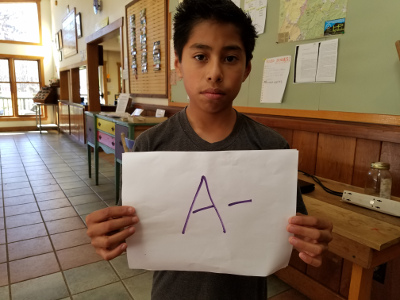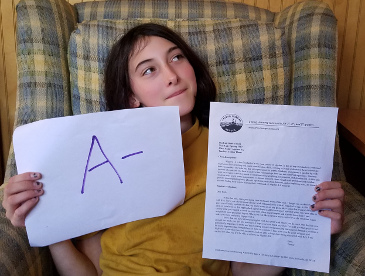Evaluations (and Grades) Help Students Transition Successfully

The debate over whether teachers should use grades or evaluations to assess their students is a big one in academic circles. Dozens of blogs and articles make strong arguments in both directions. Proponents of grades state they provide an objective and easily understandable system to compare student achievement. They are a sign of academic rigor and accountability. Members in the evaluation camp retort that narrative assessments are individualized and encourage students to improve their academic abilities. They argue that evaluations inspire intrinsic motivation and investment in one’s education.
As a solution, many schools have chosen to offer both. They provide student with a grade and then include a written evaluation to go along with it. This method provides a simple comparison tool while also giving students and their parents direct feedback about academic routines. At Arthur Morgan School, we too have made this compromise.
Evaluations are Better Teaching Tools
 As educators, we strongly believe that evaluations offer the best pathway toward academic growth. Our specific, detailed letters outline how students are doing in each of their courses. They can then see trends throughout all their studies. The evaluation is a part of the conversation between teachers and students that has already been going on all semester. It is a moment of reflection in which both parties can celebrate the student’s strengths. Then, with the help of their Academic Advisor, the students can set up goals for areas they need to grow.
As educators, we strongly believe that evaluations offer the best pathway toward academic growth. Our specific, detailed letters outline how students are doing in each of their courses. They can then see trends throughout all their studies. The evaluation is a part of the conversation between teachers and students that has already been going on all semester. It is a moment of reflection in which both parties can celebrate the student’s strengths. Then, with the help of their Academic Advisor, the students can set up goals for areas they need to grow.
For students who receive evaluations, the results can be powerful. “Joseph, an eighth grader, says, “I like that we get more than a just a letter grade. Its helps me to hear what I need to do better with. I can improve in my all my classes then.””
High Schools Require Grades
 However, in recent years we have found that for our students need additional information to transition to high school successfully. Most of our alumni attend high schools that use standard grading systems. They required a number that they could plug into their system and the evaluations were too much work to translate. Schools ended up penalizing our graduates by not placing them in honors courses or giving them GPA credit for their classes. As a result, many of our students were punished by being placed in classes beneath their academic abilities and graduating high school with lower GPA’s than their peers.
However, in recent years we have found that for our students need additional information to transition to high school successfully. Most of our alumni attend high schools that use standard grading systems. They required a number that they could plug into their system and the evaluations were too much work to translate. Schools ended up penalizing our graduates by not placing them in honors courses or giving them GPA credit for their classes. As a result, many of our students were punished by being placed in classes beneath their academic abilities and graduating high school with lower GPA’s than their peers.
How Do AMS Graduates Transition into High School?
The truth is that when you compare AMS graduates with their high school counterparts, our students perform above the curve. Many of our graduates transfer easily into honors level courses and maintain competitive grades. Because AMS focuses on building critical thinking skills and making connections between different subjects, many of our graduates find they even understand the material better than their classmates. The school’s experiential education program and social justice focus helped them recognize the real world applications of their academic work. They feel more confident expressing themselves in class because they have actual experiences to back up their knowledge.
Testimonials
 Here are some thoughts by AMS graduates:
Here are some thoughts by AMS graduates:
“Thanks to AMS, I learned the critical thinking they’re trying to teach me in college when I was thirteen. The classes taught me how to think for myself in an academic setting. Rather than blindly believe what my teachers said, I question everything and find my own proof for their answers.” -Anna, AMS Graduate 2012
“My history classes in particular focused on things that I feel most history classes either briefly mention or don’t mention at all, primarily the negative effects of American war efforts. I learned about things…which I have only discussed since reaching college.” -Taro, AMS Graduate 2010
“The curiosity and engagement coming from classmates and the staff made my academic experience at AMS very rich. How many adults talk about classes they took in middle school as some of the most memorable classes they’ve ever taken? Well, I do. Whether it was smearing peanut butter on someone’s face in anthropology, reading “the things they carried” in a core class about Vietnam, or filling a kiddy pool with cornstarch and water for a science experiment the staff at AMS kept learning interesting, fun, and memorable.” -Iris, AMS Graduate 2010
“…through the attentiveness of the loving and exciting faculty I developed a fundamental love for learning that helped me excel in my post AMS academic carrier. My time at AMS was certainly the most formative for me as a student, and it encouraged me to never stop learning or having fun.” -Sam, AMS Graduate 2011
Finding Compromise
With so much academic success, AMS did not want to punish its students by only offering evaluations. Our goal is to help our students succeed. If offering grades helps achieve that goal by making their transition to high school smoother, then we want to do it. Therefore several years ago, we changed our assessment system to offer both evaluations and grades. While students attend AMS, we solely provide them evaluations that work to them improve their academic skills. When a student leaves, we provide a transcript with grades for each of their courses. If their work in that classes demonstrates honors level course work, we provide that recognition as well.
 By holding the grades off until they graduate, we hope to keep our students focused on growing academically as opposed to strictly working for a number. We want them to see their education as a part of their development and attempt to create a culture that honors growth as opposed to achievement. Our intention is not to keep our students uninformed. Therefore if a student is interested, they can always inquire about their grades to get an understanding of where they stand.
By holding the grades off until they graduate, we hope to keep our students focused on growing academically as opposed to strictly working for a number. We want them to see their education as a part of their development and attempt to create a culture that honors growth as opposed to achievement. Our intention is not to keep our students uninformed. Therefore if a student is interested, they can always inquire about their grades to get an understanding of where they stand.
Achieving our Goals
For many staff, myself included, the decision to compromise by offering grades was a difficult one. However as I have watched many of the students I taught at AMS go on to earn scholarships based on their academic standing, I see that the compromise is worth it. Several of our graduates have received full financial aid packages to prestigious universities. They report that if AMS had not provided them grades, they would not have had the strong start that led them on this path. If our goal is to help prepare students for a successful future, then it seems by offering grades we effectively achieve that goal.
-by Nicholas Maldonado
Our Academic Program helps students transition successfully to high school in many ways!
Learn More
